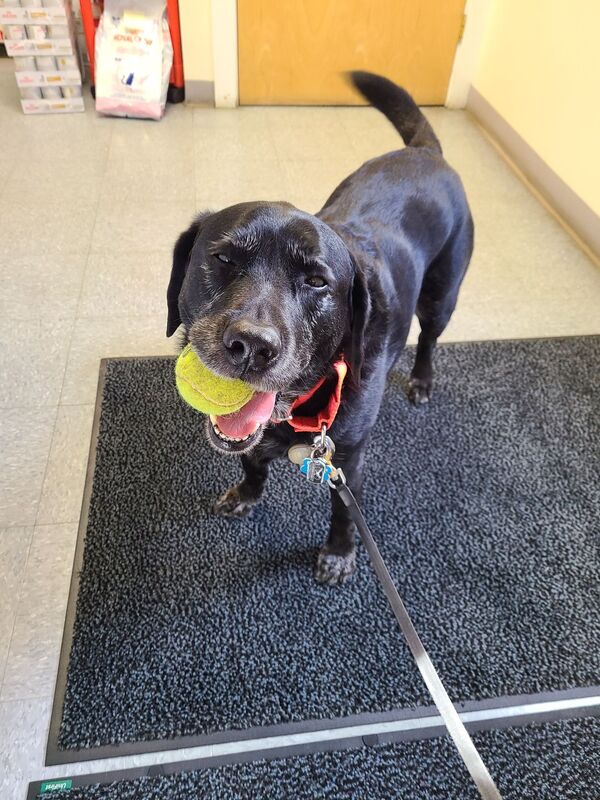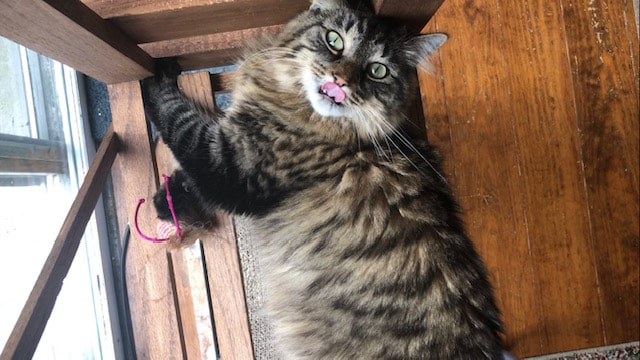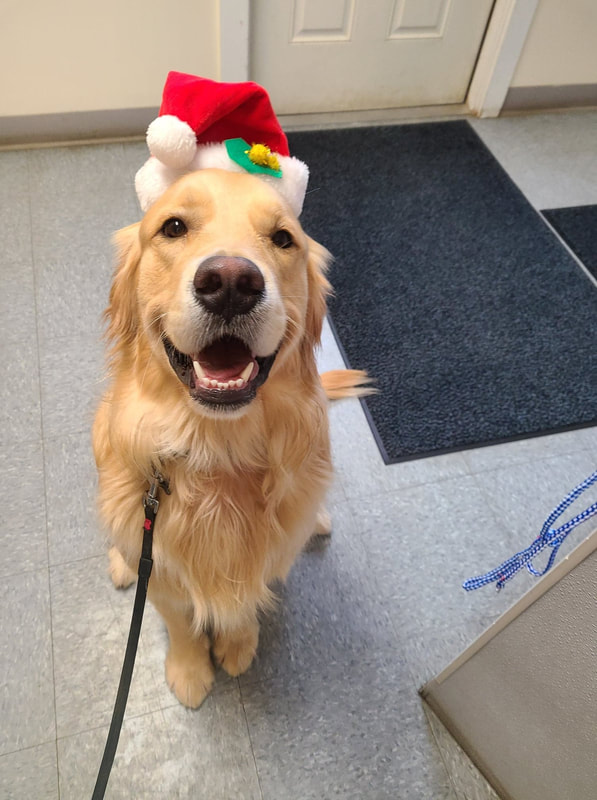0 Comments
 Is your pet due for a Fecal Exam? Routine fecal examinations are used to detect intestinal parasites in your dog or cat. These parasites may include worms (such as hookworms, roundworms, and whipworms) and protozoans that cannot be seen by the naked eye (such as Giardia or Coccidia). Parasites not only cause intestinal disease in dogs and cats, but some of them can also be infectious to humans (hookworms, roundworms, and Giardia). Some parasites have larval stages that burrow through other body tissues, such as roundworms which travel from the gastrointestinal tract to your pets’ lungs! If I am not seeing worms in my dog’s stool, how can he still have worms? Intestinal parasites live within the body and are usually not shed in the stool. These worms lay microscopic eggs that are eliminated from the body through your pets stool. You cannot see them with the naked eye. These parasite eggs enter into the environment, continue to develop and infect other animals. A fecal parasite examination searches for the eggs of these intestinal parasites. The effects of intestinal parasites can vary significantly, depending on the parasite and the overall health of the pet. Common parasites include: Roundworms . Adult animals with Roundworm infections often show no signs. In young animals or severely infected adults, signs may include vomiting, diarrhea, weight loss, a dull coat, and a potbellied appearance. Roundworm larvae also migrate through the lungs as a part of their life cycle, so coughing may be observed. Hookworms Hookworms embed in the wall of the intestine, sucking blood from their host. Therefore, the most significant effect of hookworms is anemia, resulting in lethargy, weakness, and pale gums. Weight loss and bloody diarrhea are also commonly observed. Whipworms Whipworms often cause bloody diarrhea. Affected animals may be weak and may become increasingly debilitated over time. Giardia . This protozoal parasite often causes severe watery diarrhea, which may or may not be accompanied by vomiting and weight loss. Coccidia Although infection with this protozoal parasite often has no outward signs in healthy adults, it may cause diarrhea and other signs of illness in young or debilitated adults. How will my veterinarian treat intestinal parasites that are found on routine fecal testing? If evidence of intestinal parasites are found on routine fecal testing, treatment to eliminate that parasite is prescribed. There is no anthelmintic (deworming medication) that will treat all of the species of worms. That is why it is important to know which worm your pet may. If the wrong dewormer is used, your pet will still carry the parasite and contaminate the environment. Each intestinal parasite has its own unique treatment requirements. . The type of medication, frequency and duration of treatment is dependent upon the type of parasite that is identified. And don’t forget to recheck your pets’ fecal sample after they have been treated! Sometimes multiple treatments are required in order to eliminate an infection if your pet is getting re-infected from a source within their environment. Healthy Lifestyle, Healthy Pets, Healthy People, How to Reduce Parasite Exposure – Recommendations from the Companion Animal Parasite Council: Feed pets commercial or cooked food (not raw diets) and provide fresh water. Cover sandboxes when not in use, and protect garden areas from fecal contamination. Pick up feces immediately when walking a dog in a public area and from the yard on a daily basis. To prevent roaming and limit predation, keep dogs on a leash or behind a fence and keep cats indoors. Do not handle animal feces or urine with bare hands, and wash hands immediately after incidental contact. This recommendation is particularly important for children and individuals at increased risk. Properly dispose of animal waste according to local municipal regulations. Appropriate fecal diagnostics performed at least 2-4 times a year. How to collect a fecal sample: - A fresh sample, less than 24 hours old (the fresher, the better). - If you collect a sample in the morning but cannot bring it to the clinic until the afternoon, please keep the sample refrigerated. - Samples that have not been refrigerated or are frozen will not provide accurate results. - An acorn sized sample is all that is needed to complete most testing. - If the sample you are submitting is a recheck sample to ensure that treatment was effective, make sure that the timing is appropriate – if you bring in a sample too early, it may be falsely negative and if you bring in a sample too late it will be hard to know if your pet was re-infected from the environment or if the original treatment was not effective (some parasites are starting to show resistance to dewormers and require special protocols beyond the normal recommendations).
What is a Monoclonal Anitbody?
Antibodies are produced naturally by your body and help the immune system recognize antigens (foreign material) such as bacteria and viruses that cause disease, and mark them for destruction. Like your body’s own antibodies, monoclonal antibodies are immune system proteins that provide targeted therapy. The word “monoclonal” refers to the fact that the antibodies created in the laboratory are clones. They are exact copies of one antibody. Is Librela safe for my dog? Unlike other pain medications used to treat osteoarthritis in dogs Librela is very safe and does not effect their vital organ function in the same way as other pain medications. Librela is metabolized and eliminated from the body in the same way as naturally occurring antibodies. This means that if your pet has any disease process or changes in vital organ function that may limit their options in terms of what medications they use, Librela may be a great choice! This is also a great option if your dog is stubborn about taking oral medications. The most common side effects reported are injection site pain (similar to that of a vaccination), urinary tract infections and skin irritation. Some dogs feel so much better once starting Librela that we recommend a “Return to Play” plan. Our canine companions can feel so great that they injure themselves having a good time! We will discuss your pets current activity level with you and customize a program for your pet to gradually increase their activity. Can my dog stop taking the other medications that were prescribed for pain? Some patients are able to discontinue using other pain medications, some are able to decrease the dose or frequency with which they are taking medications but starting Librela is not a guarantee that your dog will be able to stop taking other pain medications. For the first two weeks after starting Librela, continue to give your pet their other medications as prescribed and then speak with your veterinarian before making any changes. Is this available for cats? There is a similar product that is available for cats called Solensia. If you are interested in more information about this product for your cat, please call or email our clinic at 802-365-9362 or [email protected]
What's a monoclonal antibody and how does it work?
Antibodies are produced naturally by the body and help the immune system recognize antigens (foreign material) such as bacteria and viruses that cause disease, and mark them for destruction. Like your body’s own antibodies, monoclonal antibodies are immune system proteins that provide targeted therapy. The word “monoclonal” refers to the fact that the antibodies created in the laboratory are clones. They are exact copies of one antibody. The monoclonal antibody targets nerve growth factor (NGF), decreasing pain signals and making it easier for your cat to move and play. This video shows how Solensia works to help control osteoarthritis in our feline friends https://www.solensiavetteam.com/ Is Solensia safe for my cat? Solensia is very safe. It does not affect their vital organ function like other medications because it is metabolized and eliminated from the body in the same way as their naturally occurring antibodies. This means that even if your cat has any disease process in vital organs, Solensia may be a great option for them! The commonly reported side effects are occasional vomiting and injection site pain similar to that of any vaccine. It is safe to use in cats with other diseases such as kidney disease, diabetes, thyroid disease, and irritable bowel syndrome. Rarely a cat may be sensitive to the ingredient, or develop temporary allergic itch that resolves by discontinuing injections. Our hospital currently has a handful of feline friends who have started taking Solensia. The results have been amazing! If you think there’s no way that you can get your cat to the vet every month (they are hard to get in the carrier or they don’t travel well) please let us know! We have tips, tricks, and suggestions that can help you get your cat into their carriers more easily. If they get stressed out or carsick, there are oral medications that can be used to help make their travel experiences more comfortable. What about my dog? Is there something available for them? Yes! We also now also carry Librela, a monoclonal antibody to treat pain associated with osteoarthritis in dogs. Please call or email our office for more information 802-365-9362 or [email protected] For more information and other frequently asked question about Solensia, please visit https://www.zoetispetcare.com/products/solensia We will be closed on Monday, January 15th in observance of MLK day. Please plan for food and medication pickups accordingly. If you have an emergency during this time, please contact VESH (413) 665-4911 or SAVES (603) 306-0007
Thank you! This new option allows you to support local while having access to a broad range of options that ship directly to you, with comparative pricing to larger online companies.
Our online pharmacy has a wide range of products available, including monthly flea/tick and heartworm preventatives, prescription medications, and compounded medications. Discounts and promotionals are available on some products, and will be applied at checkout when applicable. Of course, we can still script medication to any pharmacy you prefer, and we still carry a selection of products in house. Please reach out with any questions as we transition to this new model. Thank you! The Team at West River Valley Vet p.s. Please note that emails from our online pharmacy will come through from e.covetrus.com, but please reach out to [email protected] or at (802)365-9362 with any questions or concerns. We will soon be adding an online pharmacy for prescriptions! We will continue keeping some supplies in stock at the clinic, but please let us know if you have any questions during this transition. We will make another announcement when the website is live, so please check back for more updates!
We will be CLOSED on Tuesday, July 4th. We will resume normal hours on
Wednesday, July 5th, at 8am. Please plan ahead for all food and medications, especially anti-anxiety needs for pets who are sensitive to fireworks. Thank you! The Holidays are fast approaching! Please see below for holiday hours:
November: We will be closing at NOON on Wednesday, 11/23 and CLOSED Thursday 11/24 in observance of Thanksgiving. December: We will be CLOSED on Monday, December 26th. January: We will be CLOSED on Monday, January 16th in observance of Martin Luther King Jr. Day. Friday, January 13th we will be open for medication pick-up only. Thursday, January 19th, we will be open for technician services only. THANKSGIVING: We will be closing at NOON on Wednesday, November 24th, and will be CLOSED Thursday, November 25th. We will reopen for regular hours at 8am on Friday, November 26th.
CHRISTMAS: We will be closing at NOON on Friday, December 24th, and reopen for regular business hours on Monday, December 27th. NEW YEARS: We will be closing at NOON on Friday, December 30th, and reopen for regular hours on Monday, January 1st. OTHER CLOSURES: We will be closed WEDNESDAY EVENINGS at 5pm on December 8th, 15th, and 29th. Please plan ahead for food, medications, and exam needs as much as possible during this time. Thank you! |
AboutHere we will post links to articles and events that may interest you. Archives
June 2024
Categories |









 RSS Feed
RSS Feed